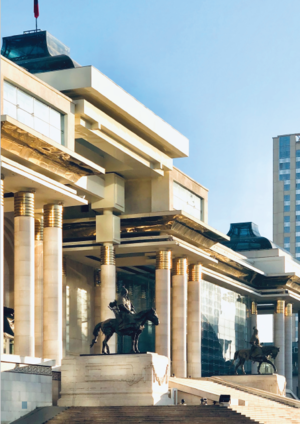Difference between revisions of "Governance in the Municipality of Ulaanbaatar"
***** (***** | *****) m Tag: 2017 source edit |
***** (***** | *****) m Tag: 2017 source edit |
||
| Line 20: | Line 20: | ||
[[File:Governance in Ulaanbaatar.PNG|thumb|Governance in Ulaanbaatar © GIZ]]Many public buildings, such as hospitals, schools, kindergartens, libraries, and dormitories were built several decades ago when standards were much lower than today. Low building standards and a lack of maintenance over the years are the main reasons for the significant increase in heat loss, and subsequently high energy consumption. | [[File:Governance in Ulaanbaatar.PNG|thumb|Governance in Ulaanbaatar © GIZ]]Many public buildings, such as hospitals, schools, kindergartens, libraries, and dormitories were built several decades ago when standards were much lower than today. Low building standards and a lack of maintenance over the years are the main reasons for the significant increase in heat loss, and subsequently high energy consumption. | ||
The comfort of those who study, work, or use services in cold buildings with high heat loss is low. On the one hand, this has a negative impact on their productivity, health and quality of life. On the other hand, it leads to a significant increase in energy consumption and operating costs, which places a strain on the budget and increases greenhouse gas emissions. | The comfort of those who study, work, or use services in cold buildings with high heat loss is low. On the one hand, this has a negative impact on their productivity, health and quality of life. On the other hand, it leads to a significant increase in energy consumption and operating costs, which places a strain on the budget and increases greenhouse gas emissions. | ||
| − | For all those reasons it was important to improve the | + | For all those reasons it was important to improve the management of public investments, and introduce new standards to improve energy efficiency through better planning, budgeting, financing, implementation and monitoring of project activities. As part of the cooperation |
| − | management of public investments, and introduce | + | between MUB and GIZ, the focus of the governance advisory work was therefore on enriching the core system with institutional quality and principles of good governance. |
| − | new standards to improve energy efficiency through | + | The project has contributed to the provision of accessible and high quality public services through the renovation of public buildings in the education sector. |
| − | better planning, budgeting, financing, implementation | + | Transparent criteria for the rating and selection of buildings for renovation measures have been developed, endorsed, and made public. A public investment guide has been developed and introduced to all relevant stakeholders. In addition, officials and staff were empowered |
| − | and monitoring of project activities. As part of the cooperation | + | through training and advisory services in order to support state organisations in creating an open, transparent, and people-centered environment. |
| − | between MUB and GIZ, the focus of the governance | + | The MUB has significantly improved the accessibility of services to meet the needs of its citizens. The efficiency of investments was increased, and the implemented policies deliver tangible results for the general public as well as specific target groups, such as the poor and vulnerable. |
| − | advisory work was therefore on enriching the | ||
---- | ---- | ||
Revision as of 09:42, 13 June 2022
Governance in the Municipality of Ulaanbaatar
Many public buildings, such as hospitals, schools, kindergartens, libraries, and dormitories were built several decades ago when standards were much lower than today. Low building standards and a lack of maintenance over the years are the main reasons for the significant increase in heat loss, and subsequently high energy consumption.The comfort of those who study, work, or use services in cold buildings with high heat loss is low. On the one hand, this has a negative impact on their productivity, health and quality of life. On the other hand, it leads to a significant increase in energy consumption and operating costs, which places a strain on the budget and increases greenhouse gas emissions. For all those reasons it was important to improve the management of public investments, and introduce new standards to improve energy efficiency through better planning, budgeting, financing, implementation and monitoring of project activities. As part of the cooperation between MUB and GIZ, the focus of the governance advisory work was therefore on enriching the core system with institutional quality and principles of good governance. The project has contributed to the provision of accessible and high quality public services through the renovation of public buildings in the education sector. Transparent criteria for the rating and selection of buildings for renovation measures have been developed, endorsed, and made public. A public investment guide has been developed and introduced to all relevant stakeholders. In addition, officials and staff were empowered through training and advisory services in order to support state organisations in creating an open, transparent, and people-centered environment. The MUB has significantly improved the accessibility of services to meet the needs of its citizens. The efficiency of investments was increased, and the implemented policies deliver tangible results for the general public as well as specific target groups, such as the poor and vulnerable.
For more information about the project please contact: XYZ





















